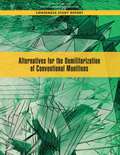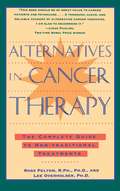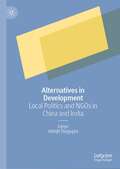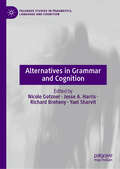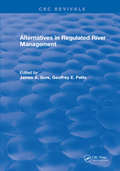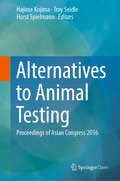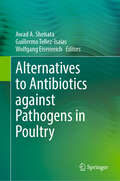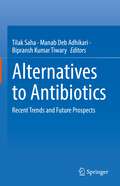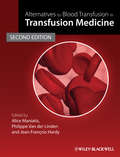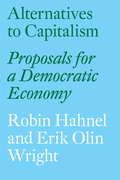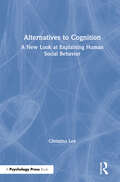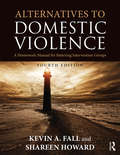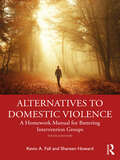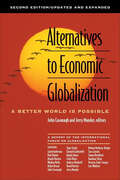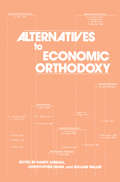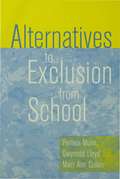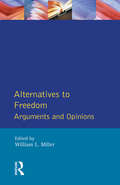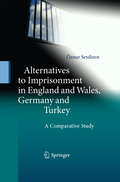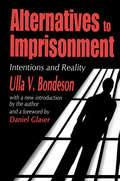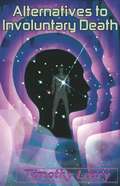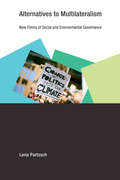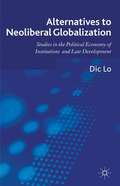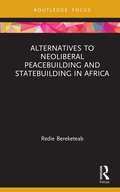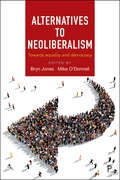- Table View
- List View
Alternatives for the Demilitarization of Conventional Munitions
by Engineering Medicine National Academies of SciencesThe U.S. military has a stockpile of approximately 400,000 tons of excess, obsolete, or unserviceable munitions. About 60,000 tons are added to the stockpile each year. Munitions include projectiles, bombs, rockets, landmines, and missiles. Open burning/open detonation (OB/OD) of these munitions has been a common disposal practice for decades, although it has decreased significantly since 2011. OB/OD is relatively quick, procedurally straightforward, and inexpensive. However, the downside of OB and OD is that they release contaminants from the operation directly into the environment. Over time, a number of technology alternatives to OB/OD have become available and more are in research and development. Alternative technologies generally involve some type of contained destruction of the energetic materials, including contained burning or contained detonation as well as contained methods that forego combustion or detonation. Alternatives for the Demilitarization of Conventional Munitions reviews the current conventional munitions demilitarization stockpile and analyzes existing and emerging disposal, treatment, and reuse technologies. This report identifies and evaluates any barriers to full-scale deployment of alternatives to OB/OD or non-closed loop incineration/combustion, and provides recommendations to overcome such barriers.
Alternatives in Cancer Therapy
by Ross Pelton Lee OverholserTHE COMPLETE GUIDE TO NON-TRADITIONAL TREATMENTS
Alternatives in Development: Local Politics and NGOs in China and India
by Abhijit Dasgupta LiyiyuThis book deals with the dynamics of local-level politics in China and India. China introduced new policies to restructure local politics in 1978. In place of communes, civil society organizations and cooperatives were introduced in villages. More changes came about with the introduction of the Organic Law of the Villagers' Committees of the People's Republic of China in 1998. The new local power structure includes state-sponsored institutions like Villagers Committees and the traditional civil society organizations (CSOs) and non-government organizations (NGOs). As in China, local politics in India undergoes considerable changes during the last few decades. Panchayati Raj Institutions (PRIs) were reformed in 1992 with a constitutional amendment act. CSOs and NGOs were allowed to function. Against this background, the present book is undertaken with the objectives first, to present two different models of local politics and second, to compare the two, finally to focus on the two different models of development. This book will interest scholars of rural governance, rural transformation, and the role of the grassroots CSOs and NGOs in shaping development program and growth in the two large countries in Asia.
Alternatives in Grammar and Cognition (Palgrave Studies in Pragmatics, Language and Cognition)
by Nicole Gotzner Richard Breheny Jesse A. Harris Yael SharvitThis edited book brings together research investigating foundational issues relating to the generation and restriction of alternative sets from theoretical and empirical perspectives. It includes contributions from noted scholars in the field to provide theoretical arguments, opinionated perspectives synthesizing existing positions, and empirical evidence from experimentation and fieldwork in support of a theoretical framework. Alternatives have come to occupy a central place in formal semantic theory, and are referenced in notable accounts of various phenomena, including focus, negation, implicature, modality, counterfactuals, and contrastive topics, among others. More recently, experimental investigations have addressed the mental activation and availability of alternatives in sentence comprehension and memory representations, finding that alternative meanings are computed during incremental processing, and persist in memory after sentence completion for a limited amount of time. The diverse perspectives represented in this volume will serve to clarify and guide the major avenues available in future research on the topic, and the book will be of interest to graduate students and researchers in fields such as linguistics (especially psycholinguistics and experimental pragmatics), philosophy and cognitive science.
Alternatives in Mobilization: Ethnicity, Religion, and Political Conflict
by Jóhanna Kristín Birnir Nil Seda ŞatanaWhat determines which identity cleavage, ethnicity or religion, is mobilized in political contestation, be it peaceful or violent? In contrast to common predictions that the greatest contention occurs where identities are fully segmented, most identity conflicts in the world are between ethnic groups that share religion. Alternatives in Mobilization builds on the literature about political demography to address this seeming contradiction. The book proposes that variation in relative group size and intersection of cleavages help explain conundrums in the mobilization of identity, across transgressive and contained political settings. This theory is tested cross-nationally on identity mobilization in civil war and across violent conflict in Pakistan, Uganda, Nepal and Turkey, and peaceful electoral politics in Indonesia. This book helps illustrate a more accurate and improved picture of the ethnic and religious tapestry of the world and addresses an increasing need for a better understanding of how religion contributes to conflict.
Alternatives in Regulated River Management
by James A. GoreResearchers and managers of regulated river systems will find this volume useful in acquiring information for deciding an integrated management plan for regulated river operations. Rather than the ecological theory of impacts of flow regulation, emphasis has been placed on methods to predict water quality and habitat alterations, as well as techniques to mitigate impacts from various operational scenarios. Although most chapters refer to impacts of riverine impoundments, these alternatives apply to any regulated situation in which changes in water quality or flow pattern occur. The predictive modeling techniques are explained primarily from a theoretical background. However, extensive bibliographies can guide the uninitiated to specific texts and software. Where controversial techniques have been presented, alternate methods are also described. Major topic areas include water quality problems, channel modification and management, ecological modeling and management, as well as a section on perspectives for ecological management and special problems in developing nations.
Alternatives to Animal Testing: Proceedings of Asian Congress 2016
by Hajime Kojima Troy Seidle Horst SpielmannThis open access book presents recent advances in the pure sciences that are of significance in the quest for alternatives to the use of animals in research and describes a variety of practical applications of the three key guiding principles for the more ethical use of animals in experiments – replacement, reduction, and refinement, collectively known as the 3Rs. Important examples from across the world of implementation of the 3Rs in the testing of cosmetics, chemicals, pesticides, and biologics, including vaccines, are described, with additional information on relevant regulations. The coverage also encompasses emerging approaches to alternative tests and the 3Rs. The book is based on the most informative contributions delivered at the Asian Congress 2016 on Alternatives and Animal Use in the Life Sciences. It will be of value for those working in R&D, for graduate students, and for educators in various fields, including the pharmaceutical and cosmetic sciences, pharmacology, toxicology, and animal welfare. The free, open access distribution of Alternatives to Animal Testing is enabled by the Creative Commons Attribution license in International version 4: CC BY 4.0.
Alternatives to Antibiotics against Pathogens in Poultry
by Awad A. Shehata Guillermo Tellez-Isaias Wolfgang EisenreichThis volume provides a comprehensive overview of poultry intestinal health and recent advances in alternatives to drug treatment of significant disorders. The chapters start with an insight into immunological processes and the communities of gut microbiota. In the following, a range of antibiotic alternatives in poultry feed and production management is presented, including enzymes, phytobiotics, bacteriophages, the use of probiotics, synbiotics, and many more. Expert contributions on the latest technological and diagnostic developments in the field round off this work to accelerate the study of natural products and next-generation disease therapy. Meeting the demand to combat increased resistance to classic treatment methods, this book forms an indispensable guide for all professionals, veterinarians, nutritionists, students and researchers in the poultry industry, food production, and academia.
Alternatives to Antibiotics: Recent Trends and Future Prospects
by Tilak Saha Manab Deb Adhikari Bipransh Kumar TiwaryThis book discusses prospective alternative approaches to fight bacterial infections to minimize the indiscriminate use of conventional antibiotics. It offers the current knowledge on research and development of alternative antibacterial agents such as probiotics, nanobiotics etc. while it also discusses newly emerging trends such as phage therapy, antibody therapy etc. The book highlights on the phytochemicals with potent antibacterial activities as alternatives to conventional antibiotics. Chemical modification to develop next generation antibiotics with enhanced efficacy has also been included. Such modifications are reported to overcome the inherent resistance of the parent antibiotics. Phage therapy and targeted antibodies are considered as potential alternative approaches to treat bacterial ailments and represent areas of cutting-edge research and have therefore been discussed with sufficient care. Mainly, the book highlights various approaches other than conventional antibiotics in treating bacterial infections. The scientific advancements in these areas will strengthen the ‘One Health’ approach benefiting human beings, animals and environment as well. This book is a comprehensive resource to cater researchers, biological scientists, herbalists and clinical practitioners with up-to-date information on antibacterials other than antibiotics.
Alternatives to Blood Transfusion in Transfusion Medicine
by Jean-François Hardy Phillipe van der Linden Alice ManiatisMeeting the needs of patients while minimizing blood transfusions requires special expertise, precise monitoring and innovative techniques. This cutting-edge resource covers all the important clinical aspects of transfusion medicine in diverse clinical settings, with a special emphasis on alternatives to transfusion.Edited by a multidisciplinary team consisting of a transfusion specialist, an anesthesiologist and an intensive care specialist this book is endorsed by the Network for Advancement of Transfusion Alternatives. The contributors review the appropriate use of fluids and of blood products, and describe the latest treatment options available to decrease the need for allogeneic blood products including:Argon beamCell saverHarmonic scalpelNormovolemic haemodilutionSynthetic erythropoietinAntifibrinolyticsRecombinant factor VIIaAdvanced monitoring of hemostasisIntravenous ironThe new edition is a key reference source for all those involved in the practice of blood management and conservation.
Alternatives to Capitalism: Proposals for a Democratic Economy
by Erik Olin Wright Robin HahnelWhat would a viable free and democratic society look like? Poverty, exploitation, instability, hierarchy, subordination, environmental exhaustion, radical inequalities of wealth and power--it is not difficult to list capitalism's myriad injustices. But is there a preferable and workable alternative? Alternatives to Capitalism: Proposals for a Democratic Economy presents a debate between two such possibilities: Robin Hahnel's "participatory economics" and Erik Olin Wright's "real utopian" socialism. It is a detailed and rewarding discussion that illuminates a range of issues and dilemmas of crucial importance to any serious effort to build a better world.From the Trade Paperback edition.
Alternatives to Cognition: A New Look at Explaining Human Social Behavior
by Christina LeeIn this provocative book, Christina Lee takes a consciously critical approach to the apparently unchallenged principle that conscious thought is the cause of all human behavior. Without becoming polemical or destructive, she reconsiders a wide range of issues in mainstream American and European social psychology. Suitable for an international audience, the book deals with issues in mainstream American and European social psychology. It assumes some familiarity with contemporary social and applied psychology, and would be appropriate as a text or supplementary reading for senior undergraduate and postgraduate courses in social psychology and psychological theory, although it is also written with an academic research audience in mind. While it is written largely for psychologists, it would also be of interest to academics from other social-science disciplines with a general interest in explanations of individual social behavior.
Alternatives to Domestic Violence: A Homework Manual for Battering Intervention Groups
by Kevin A. Fall Shareen HowardAlternatives to Domestic Violence, 4th Edition is an interactive treatment workbook designed for use with a wide variety of accepted curricula for domestic violence intervention programs. This new edition adds and revises the exercises and stories in every chapter, covering important topics such as respect and accountability, maintaining positive relationships, good communication, parenting, substance abuse, digital abuse, and sexuality. Chapters on parenting, substance abuse, and religion have also been heavily revised based on current literature and group member feedback. The chapters provide a comprehensive collection of vital topics, including topics rarely addressed in other curricula, and exercises help the group members learn new strategies for leading a life of cooperation and shared power. Continuing the tradition of past editions, this edition not only focuses on the content of a good BIPP curriculum, but it also stresses the group process elements that form the backbone of any quality approach.
Alternatives to Domestic Violence: A Homework Manual for Battering Intervention Groups
by Kevin A. Fall Shareen HowardAlternatives to Domestic Violence, fifth edition, is an interactive treatment workbook designed for use with a wide variety of accepted curricula for intimate partner violence intervention programs. The new edition adds and revises the exercises and stories in every chapter, covering important areas including respect and accountability, maintaining positive relationships, parenting, substance abuse, and sexuality. Innovative chapters explore parenting, religion, communication, and substance abuse, and deepen readers’ understanding of controlling behavior. Chapters incorporate discussion of digital and internet-based abuse, and a new "Voice of My Partner" exercise has been added to core chapters to encourage group members to explore the impact of their behavior and learn and practice empathy-focused skills. Continuing the tradition of past editions, this edition not only focuses on the content of a good BIPP curriculum, but it also stresses the group process elements that form the backbone of any quality approach. Intimate partner violence group leaders and members will find this workbook to be a vital resource for adopting new strategies to lead a life of cooperation and shared power.
Alternatives to Economic Globalization: A Better World Is Possible
by John Cavanagh Jerry MandersWritten by a premier group of 21 thinkers from around the world, the second edition of Alternatives to Economic Globalization lays out democratic, ecologically sound, socially just alternatives to corporate globalization more fully, specifically, and thoughtfully than has ever been done before. Focusing on constructive, achievable goals, the authors present ten governing principles for establishing truly sustainable societies and describe alternatives to the World Bank, the IMF, and the WTO that would better serve the needs of the planet. They offer detailed proposals for protecting vital goods and services from corporate exploitation, limiting corporate privileges and power, rebuilding economies to make them more responsive to human needs, and more. This revised and expanded edition features a new opening chapter on the global balance of power, a new section on the media and globalization, and a new final chapter on what ordinary citizens can do to fight the injustices of globalization. It also includes many new charts, sidebars, and other updated information.
Alternatives to Economic Orthodoxy: Reader in Political Economy
by Randy AlbeldaExploring the question of whether China's peasantry was a revolutionary force, this volume pays particular attention to the first half of the 20th century, when peasant-based conflict was central to nationwide revolutionary processes. It traces key themes of social conflict and peasant resistance.
Alternatives to Exclusion from School
by Mairi Ann Cullen Pamela Munn Gwynedd Lloyd`. . . an excellent volume, one which should become essential reading for students of education, especially those at the start of their careers. Incidentally, not only is the book concise; unusually for a jointly-authored book it is also hard to see the joins; it really does read well' - Scottish Affairs `An interesting comparison of pairs of schools which differed in the extent to which they excluded, the authors found several differences: the schools' views on what education is all about; the way the curriculum is structured; relations with parents; and decision-making about exclusion' - Times Educational Supplement Exclusion from school is a major concern for teachers, parents and children, and features in government initiatives. This book takes a broad look at exclusion, mapping the extent of exclusions and showing what factors can lead to children being excluded, whether permanently or informally, from school. The authors focus on various kinds of in-school alternatives to exclusion. They show how schools and teachers can make a difference to young people's emotional and social development, as well as to their cognitive-intellectual development. For many children with difficulties in their families or communities, school can be a safe and supportive refuge. School is also much more than just the subjects on the timetable, and the authors look in detail at the hidden curriculum, or school ethos, as a means of preventing exclusion. The book goes beyond in-school alternatives to consider the effectiveness of out-of-school provision, and raises questions about how to conceptualize effectiveness. The authors consider perspectives on exclusion from other countries including the United States, and place exclusion from school in the broader context of social exclusion.
Alternatives to Freedom: Arguments and Opinions
by William L. MillerThis authoritative text concerns itself with freedom and `alternatives to freedom', based on original survey research of public attitudes to civil and political rights.It combines and connects explicit and implicit arguments for freedom, with the judgements of public opinion on two levels the general public and politicians encouraging the reader to think about issues both in terms of political theory and public opinion.The issues considered, all of which may be viewed as alternatives to the narrow conception of freedom as the absence of coercion, are:* parliamentary sovereignty* the national interest* responsibility* accountability* equality* the moral communityAlternate chapters present powerful arguments from political figures such as Lord Armstrong, Lord Jenkins and Roy Hattersley, based on practical experience, and then assess public opinion for each issue.
Alternatives to Imprisonment in England and Wales, Germany and Turkey: A Comparative Study
by Öznur SevdirenThe book focuses on one of the most problematic areas of Turkish penal justice: the overreliance on custodial measures and a corresponding growth in the prison population, and compares Turkey with two major European countries in this respect: England and Wales and Germany. The underlying question throughout the study is the extent to which prison alternatives can be seen as genuine alternatives to immediate custodial sentences.
Alternatives to Imprisonment: Intentions and Reality
by Ulla V. BondesonThe detrimental effects of imprisonment have been documented and accepted in most western countries. As a result, alternatives to incarceration have been sought in the effort to reform the penal system. Although during the last thirty years several Nordic official committees have recommended a reduction in the use of jail sentences and an increase in other forms of punishment (i.e. fines and probation) in the hope of decreasing crime and rehabilitating criminals, incarceration rates have been going up in Sweden, Denmark, and Norway. Still, the interest in alternatives to imprisonment continues to grow, but few studies have actually been published that examine their effectiveness.
Alternatives to Involuntary Death
by Timothy LearyDeath is increasingly on the agenda for baby boomers moving ever closer to it. Timothy Leary brings some startlingly fresh ideas to this topic. Fundamentally, he claims, we have been brainwashed by our institutions - government, organized religion, the healthcare industry - to accept death as an inevitable end. Leary argues instead that death is misunderstood, that we don't have to die, and that there are "commonsense alternatives." His theory rests on the transhumanist approach that says human beings are evolving into spiritual machines - beings that are part human and part machine and eventually will not die as the term is commonly understood. Being fitted with machine parts like bionic knees is part of this process. And as we evolve through the cybernetic age, he says, we will gain new wisdom that broadens our definition of personal immortality and gene-pool survival - the "postbiologic option of the information species."
Alternatives to Multilateralism: New Forms of Social and Environmental Governance (Earth System Governance)
by Lena PartzschAnalysis and case studies of emerging forms of private, public, and hybrid social and environmental governance.The effects of globalization on governance are complex and uncertain. As markets integrate, governments have become increasingly hesitant to enforce regulations inside their own jurisdictions. At the same time, multilateralism has proven unsuccessful in coordinating states' responses to global challenges. In this book, Lena Partzsch describes alternatives to multilateralism, offering analyses and case studies of emerging--alternative--forms of private, public, and hybrid social and environmental regulation. In doing so, she offers a unique overview of cutting-edge approaches to global governance.
Alternatives to Neoliberal Globalization
by Dic LoThrough a compliance with the neoliberal doctrines associated with the Washington Consensus, and the corresponding emphasis on the privitization of public assets, the promotion of well-defined property rights and a focus on price and trade liberalisation, developing countries have been promised that 'natural economic institutions' will form. However, despite the promotion of these doctrines, the 1980s and 1990s have come to be known as the 'lost decades of development': a period of long economic stagnation in most parts of the developing world, with little sign of the income level of the developing world converging with that of developed countries. In this book, Dic Lo re-examines the mainstream policy doctrines of globalization, and formulates explanations for the uneven development of recent years. Through a comparative analysis of the actual experiences of developing nations and their policy positions, this book clarifies the positive and negative lessons that can be learned by developing countries. Dic Lo also undertakes an examination of the theoretical underpinnings of the competing doctrines of institutions and development, with a view to creating a synthesis that transcends neoliberalism, instead emphasising solidarity and humanistic development.
Alternatives to Neoliberal Peacebuilding and Statebuilding in Africa (Routledge Studies in African Development)
by Redie BereketeabThis book critically interrogates the neoliberal peacebuilding and statebuilding model and proposes a popular progressive model centred around the lived realities of African societies. The neoliberal interventionist model assumed prominence and universal hegemony following the demise of state socialism at the end of the Cold War. However, this book argues that it is a primarily short-term, top-down approach that imposes Western norms and values on conflict and post-conflict societies. By contrast, the popular progressive model espoused by this book is based on stringent examination and analysis of the reality of the socio-economic development, structures, institutions, politics and cultures of developing societies. In doing so, it combines bottom-up and top-down, popular and elite, and long-term evolutionary processes of societal construction as a requisite for enduring peacebuilding and statebuilding. By comparing and contrasting the dominant neoliberal peacebuilding and statebuilding model with a popular progressive model, the book seeks to empower locals (both elites and masses) to sit in the driver’s seat and construct their own societies. As such, it is an important contribution to scholars, activists, policymakers, civil society organisations, NGOs and all those who are concerned with peace, stability and development across Africa and other developing countries.
Alternatives to Neoliberalism: Towards Equality and Democracy
by Bryn Jones and Mike O’DonnellIn this collection, innovative and eminent social and policy analysts, including Colin Crouch, Anna Coote, Grahame Thompson and Ted Benton, challenge the failing but still dominant ideology and policies of neo-liberalism. The editors synthesise contributors’ ideas into a revised framework for social democracy; rooted in feminism, environmentalism, democratic equality and market accountability to civil society. This constructive and stimulating collection will be invaluable for those teaching, studying and campaigning for transformative political, economic and social policies.
